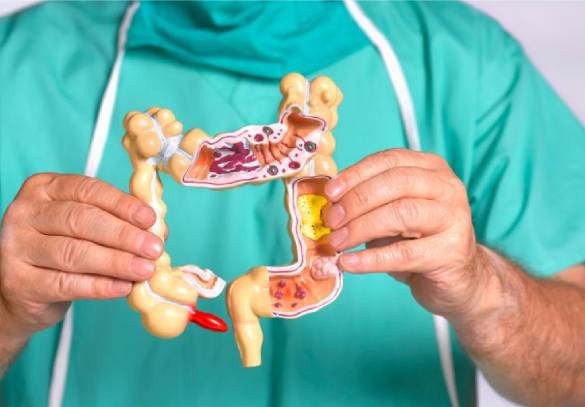Colonoscopy
Colonoscopy
A colonoscopy is a check-up to find any changes in the big intestine and rectum, like swollen parts, polyps, or even cancer. The doctor uses a long, bendy tube with a small camera on the end, called a colonoscope, and puts it in through your bottom. This camera helps the doctor see everything inside your colon.
If they see anything unusual, like polyps or weird tissue, they can take it out during the colonoscopy. They might also take small pieces for testing, called biopsies, just to make sure everything is okay.

Why it’s done
Your doctor may recommend a colonoscopy to:
- Investigate intestinal signs and symptoms. A colonoscopy can help your doctor explore possible causes of abdominal pain, rectal bleeding, chronic diarrhea and other intestinal problems.
- Screen for colon cancer. If you’re age 45 or older and at average risk of colon cancer — you have no colon cancer risk factors other than age — your doctor may recommend a colonoscopy every 10 years. If you have other risk factors, your doctor may recommend a screen sooner. Colonoscopy is one of a few options for colon cancer screening. Talk with your doctor about the best options for you.
- Look for more polyps. If you have had polyps before, your doctor may recommend a follow-up colonoscopy to look for and remove any additional polyps. This is done to reduce your risk of colon cancer.
- Treat an issue. Sometimes, a colonoscopy may be done for treatment purposes, such as placing a stent or removing an object in your colon.
How you prepare
Before a colonoscopy, you’ll need to make sure your colon is completely empty for a clear view. Here’s what you might have to do:
Special Diet: The day before the test, you can’t eat regular food. Stick to clear liquids like water, tea, coffee without milk, broth, and fizzy drinks. No red liquids. And, after midnight the night before, no eating or drinking.
Laxative Time: Your doctor might tell you to take a strong laxative. This could be pills or a liquid. Usually, you’ll take it the night before the colonoscopy, or sometimes both the night before and the morning of the procedure.
Medication Check: About a week before the test, remind your doctor about all the meds you take. Especially if you have diabetes, high blood pressure, or heart issues. If you take aspirin, blood thinners, or other heart meds, your doctor might need to change your doses or have you stop them for a bit.
It’s all to make sure the colonoscopy gives the best and clearest results!
After the procedure
After the test, it takes about an hour to start feeling better from the sleepy medicine they gave you. Someone should take you home because it might take a whole day for the medicine to completely wear off. Don’t drive, make important decisions, or go back to work on that day.
You might feel a bit bloated or pass gas for a few hours afterward as your belly gets back to normal. Taking a short walk can help you feel better.
When you use the bathroom for the first time after the test, you might see a little bit of blood. Usually, it’s not a big deal, but if you keep seeing blood, have pain, or a fever, let your doctor know. It’s rare, but these things could happen right after the test or a week or two later.
